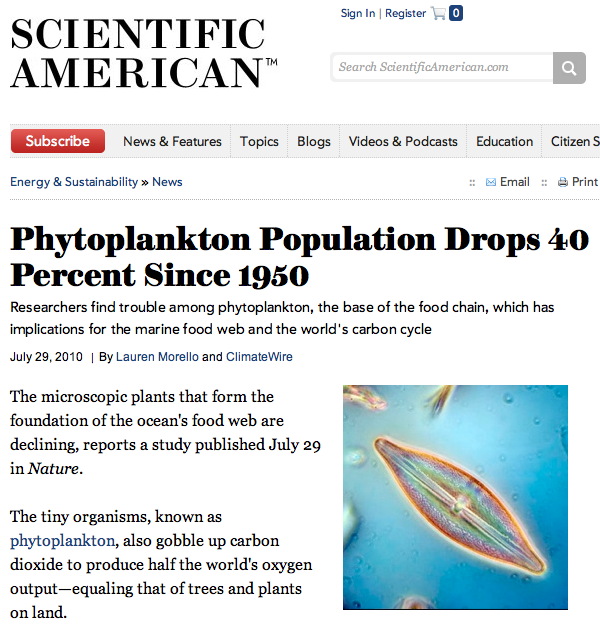#375) The Sometimes Dubious “Self-Correcting” Nature of Science: The “40% Phytoplankton Decline” Mess
December 9th, 2014
As people scold Rolling Stone this week for their inaccurate rape story, scientists should take a look at their own profession and realize how equally poor the policing of accuracy is. Last week I shouted out at a public event when I heard, once again, an environmental alarmist citing the blatantly erroneous number of 40% decline in the world’s phytoplankton population that was published in Nature four years ago then discredited by numerous scientists later in Nature. But that person can hardly be blamed when the entire profession is run in such a sloppy manner. And “sloppy” is the right term. Had the number been 4% then “self correcting” would be appropriate. But 40%? It was a surreal headline that was only barely addressed later.

SCIENTIFIC AMERICAN HAD NO TROUBLE PARROTING THE ERRONEOUS REPORT. Nature published a study in 2010 by Boyce et al. claiming the world’s phytoplankton had declined by 40% since 1950. To those of us with a background in plankton ecology the number was bizarre. Eventually a series of papers also in Nature showed how far off the mark that headline was. One of the papers questioned whether phytoplankton levels today were at all different from 1950. Bottom line, what a mess, yet allowed to just vanish with a tiny, “oops!” — less scolded publicly than Texas Governor Rick Perry’s inability to remember three things.
SAME AS ROLLING STONE
As the public rightfully pillories Rolling Stone this week for their inaccurate treatment of a rape story, the science world should keep in mind that it also makes plenty of mistakes and is not as perfectly “self-correcting” as it likes to think.
Three years ago at the Aspen Environment Forum in a Q&A a fellow who was certain the world is falling to pieces, in the middle of his rant about world decline, cited the Nature-published factoid of “40% decline in phytoplankton worldwide.” I later pointed out to the group that the factoid was nonsensical and was eventually completely discredited. Which then prompted the guy to come after me later accusing me of being a climate skeptic. When I tried to point him to the detailed, thoughtful treatment of the phytoplankton study Andy Revkin gave it on his Dot Earth NY Times blog (he did an excellent post titled, “On Plankton, Warming and Whiplash”) the guy shouted, “He’s a climate skeptic, too.” Such is the treatment you get for trying to police the truth in the science world.
Last Thursday night I attended a talk by Naomi Oreskes, also about the decline of our planet, where yet another rabid alarmist in the Q&A cited the same 40% study which irked me so much I rudely shouted out, “THAT’S WRONG,” causing members of the audience to glare at me as if I was Representative Joe Wilson shouting, “You lie!” at Obama. What can I say — I still have delusions of living in a world built around well established science.
PHYTOPLANKTON LUNACY
Phytoplankton are responsible for half of the primary production on the planet. How do you reduce their biomass by almost half and not have utter and complete calamity? That was my first thought in 2010 when I saw the bizarre headline. And before you answer, “There is indeed utter and complete calamity in the world’s oceans,” let me cite the same sort of words of skepticism from Paul Falkowski, a member of the National Academy of Sciences who is one of the definitive voices on this branch of science. He dismissed the Boyce et al. paper by saying:
Inspection of the data reveal (not too surprisingly) large gaps in several areas of the oceans and I seriously doubt their conclusion that phytoplankton biomass declined by 40% over the past century. Were that so, we almost certainly wouldn’t be seeing the deoxygenation of large areas of the open ocean today.
DESTROYING PUBLIC TRUST
I really still can’t get over the Boyce et al. paper and the follow through. How does Nature publish such a cockamamie finding? Four percent would have been plausible, but 40%? An entire order of magnitude? And why isn’t there a public discrediting of the scientists who reached so far? All they ever got was a set of papers that politely said pretty much all of the world’s data “are not in accordance with their conclusions.”
But the real world problem today is that if you search “40% phytoplankton decline” you find pages and pages of websites citing the factoid uncritically — like the Scientific American article above that instantly propagated the crazy headline, presumably without running it by at least a few phytoplankton biologists.
Which is the problem with the whole retraction thing. Nobody hears about the retractions. And in this case, there wasn’t even a retraction — just the authors replying to all the papers discrediting their findings by basically saying they agree, more research is needed.
It’s pretty bad for a profession where credibility is its life’s blood. That’s really all I can say about it. The truth matters, and is supposed to matter to scientists, but this ends up being a case study of the Hollywood mentality of, “Next.” Meaning that rather than cleaning up the mess we made with the last project, let’s just forget about it and move on to something new. I see it all the time in Hollywood. But I expect better from science.
It’s not the way to build trust.